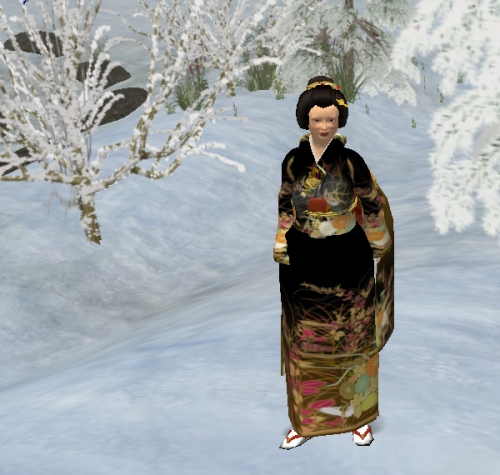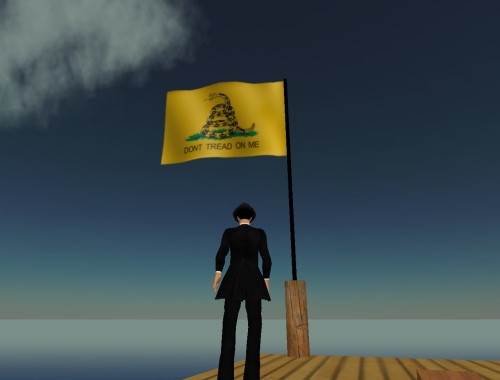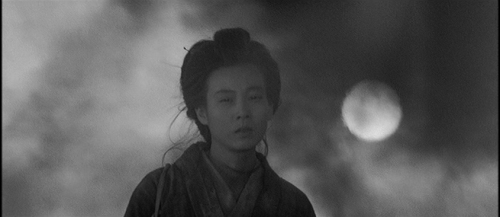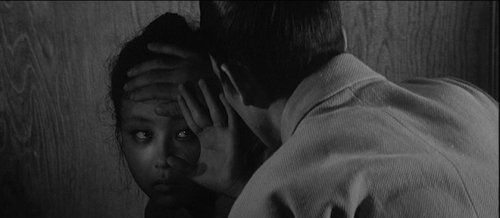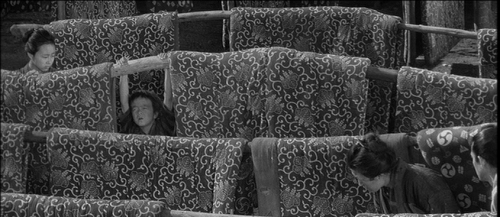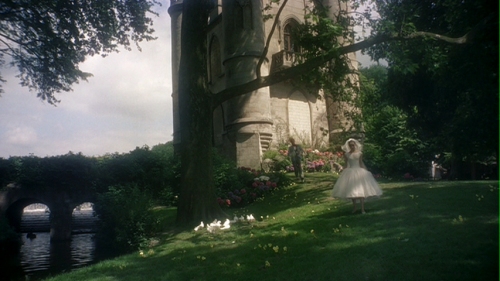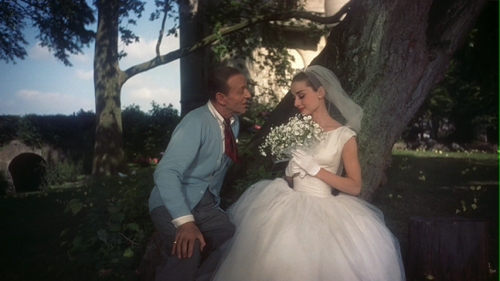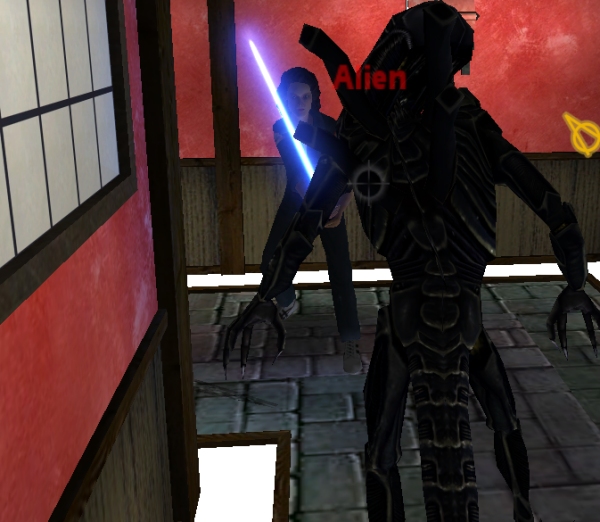
Vertigo (1958)
Directed by Alfred Hitchcock
Creation and control are the chief objectives for all the major characters in this movie, which is also about the different tactics people use in pursuing those objectives--generally employing systems of illusory or disingenuous roles. Ultimately, nothing works out as anyone plans, to the misfortune of three of the four main characters, as chaos and momentum warp designs past the thresholds of designers' parameters. What remains is naked need, people pleading for affection but stripped of the cunning they hoped would provide paths to satisfying need.
The movie's central relationship, between John "Scottie" Ferguson (James Stewart) and Judy Barton (Kim Novak), features the most painful example of thwarted designs because a side effect of the illusory constructs in this case was that they both fell in love. Whether or not they fell in love with each other is a more difficult question, and not one with a simple yes or no answer.
The character who most consciously orchestrates a scheme of manipulation and illusion is the one most infrequently seen; Gavin Elster (Tom Helmore). Instead it is mostly only the effects of his schemes--both intended and unintended--that are seen. One could say that the entire movie is a demonstration that luck is an important component to the success of any plan, and that true power and true freedom are no more than conceits. The most intricate plan must always be subject to the desires and perceptions of the individuals concerned. There's no circumventing free will, unfortunately for most of the people involved.

Elster's savvy enough to know that one has to account for human nature and desire when laying one's plans. It's useful for him that the people he's manipulating believe they're doing what they're doing for their own reasons, and not his. Elster manages this by making each step on the path he lays out for Scottie properly provocative in its own right.
When Scottie first meets with Elster at the shipyard, there's a small moment that very clearly demonstrates Elster's knack for this.
ELSTER: "Scottie, do you believe that someone out of the past, someone dead, can enter and take possession of a living being?"
SCOTTIE: "No."
ELSTER: "If I told you that I believe that this has happened to my wife, what would you say?"
SCOTTIE: "Well, I'd say take her to the nearest psychiatrist. Or psychologist. Or neurologist, or psychoan--or maybe just the plain family doctor! I'd have him check on you, too."
ELSTER: "Then you're of no use to me. I'm sorry I've wasted your time."
Scottie makes like he's about to leave, but then hesitantly turns back. This is where Elster's got his hooks into him.
Scottie says he's sorry to be so dismissive of the problem, and Elster convinces him to observe his wife, without her knowledge, at a restaurant.
What Elster did here was that he presented with conviction what he knew Scottie would find to be an utterly preposterous story, something to which Scottie could only react with loud disbelief. When Elster acts dismayed by Scottie's reaction, it naturally provokes a feeling of guilt in Scottie, which Elster is then able massage into a vague feeling of debt, only heightened when Scottie reflexively says, "I'm supposed to be retired! I don't want to get mixed up in this darned thing . . ."
Elster knows something else important about Scottie; Scottie's a romantic, though James Stewart's usual down-to-earth portrayal may not make that obvious. Which is of course what makes the casting of Stewart so ingenious. Bernard Herrmann thought that someone like Charles Boyer would have been more appropriate for the role, but in Stewart, we can't mistake the romanticism for something the character's aware of about himself. Scottie's an idealist, through and through. He sees himself as a sort of hero, and sees his primary goal in life as effecting justice. That's Scottie's agenda, which is thwarted by imperfections in his nature that he never thought to account for.
In one of the movie's first scenes, Scottie's having an idle conversation with his friend Marjorie "Midge" Wood (Barbara Bel Geddes). In a very deft bit of exposition, Midge mentions that Scottie had been a lawyer who switched to working as a policeman because he had decided that he was going to be chief of police one day. Scottie's not someone to be bound by a career path and indeed believes he lives in complete freedom. He mentions to Midge that he's retiring, and feels he can because he is a man of "independent means," which suggests perhaps an inheritance, or some other means of having acquired enough money to live off of so that he's not only able to abruptly alter his career path at whim, but he was able to retire as a plainclothes detective. Work has never been about survival for Scottie; it's been about pursuing his idealistic aims.
But there's one thing Scottie's never had, or had only briefly and many years ago--a lover. He and Midge had been engaged in college--for only three weeks, before she called it off. Now Scottie says, "I'm still available. Available Ferguson." There's a barely suppressed, bitter edge to Scottie's voice, leading one to believe that he may indeed have been single ever since college. And labelling himself "Available Ferguson" in itself suggests that he's been alone for so long that being single is something he believes is associated with him by his acquaintances. Considering the two very demanding careers he'd chosen for himself, one might suppose he kept himself busy entirely with work.
It's clear that Midge is still in love with him ("You know there's only one man in the world for me, Johnny-O"), so why did she call off the engagement, and why haven't the two of them been lovers again since? The answer is in a furtive look Midge gives Scottie when he says, with a mildly irritable dismissiveness, "Now, Midge, don't be so motherly."
Unfortunately, that's in one word the role Midge has settled into in their relationship; mother. In college, she had probably finally realised that Stewart was a romantic, so she had written an agenda for herself: love him, nurture him, but don't marry him unless and until he becomes your equal. Midge assumes her pragmatism makes her more of an adult than Scottie. Unfortunately for Midge, her agenda can't withstand the unpredictability of human nature, and the fact that no human is as simple as either of the roles in which she's cast herself and Scottie.
Scottie's irritation when he says "motherly" shows this isn't the dynamic he perceives as existing between the two of them, or wants to exist between the two of them. The discussion of their respective love lives follows a brief, candid discussion about women's undergarments, with a strange, lacy pink bra as a prop. To an audience in 1958, this would have seemed quite racy, and it would have been clear that Scottie and Midge are unusually comfortable discussing sexuality for a man and woman who aren't involved. They even seem to get a bit of a charge out of it.

They have no hope of going beyond this sort of provocative, relaxed friendship so long as Midge adheres to her agenda. So long as Midge's personality forces an inequality on the relationship, the two can't connect. Inequality is repeatedly shown to be the most destructive factor in the relationships featured in Vertigo.
Elster tells Scottie how he longs for the "power" and "freedom" enjoyed by wealthy men in old San Francisco. Through his actions in the film, it's revealed that Gavin prefers total dominance in his relationships with women and very little intimacy. He cares so little about his wife that he's hatched an elaborate scheme in order to kill her and claim her enormous financial assets. He's having an affair with Judy Barton, whom he uses to pose as his wife and mislead Scottie, and then abandons her when he no longer has any use for her. The ghost he decides to tell Scottie has possessed his wife may or may not actually be an ancestor of the real Mrs. Elster, but she is Carlotta Valdes, a young woman who went mad when her wealthy lover abandoned her and took her child.

Unlike Scottie, Elster is not a man of independent means, though he'd very much like to be and he's willing to do anything to attain that status, even marry a woman and kill her for her money. Perhaps because he doesn't understand the nature of truly loving human relationships, he doesn't anticipate Scottie and Judy falling in love. He assumes his money is power, he fails to anticipate that Scottie's earnest desire to protect her and help her would be more attractive to her. Like Midge, Elster errs because of his faith in pragmatism, but unlike Midge, Elster's agenda is not foiled by this unforeseen circumstance. Which shows that, while nature may not be controlled by the schemes of humans, it does not rebel in order to exact justice. This may indicate that Alfred Hitchcock did not believe in a benevolent god. In any case, nothing trumps free will here. The movie is distinctly existentialist, as all good films noir are.
No-one in the movie demonstrates the existential idea of free will that cannot be controlled by a chosen role or exterior influence better than Judy Barton.

When seen later in the movie with hairstyle and clothing she's presumably chosen for herself, Judy's style is brash and somewhat bizarre. Her form fitting green sweater is revealing, but bears a distracting pokka dot trim. Her hair and makeup are bold contrasts, but very strange, her forehead framed by obviously artificially arranged, flattened ringlets. From her appearance, one might deduce that Judy has passion, but lacks the sophistication required to craft a look that makes her as carnally attractive as she wants to be. This lack of sophistication also prevents her from hatching a scheme like Elster's; when she met him, she must have been something of a thug. She obviously didn't mind getting involved with a man for money, and she obviously didn't mind accepting the role of Mrs. Elster's impostor. The means and objectives of Gavin's scheme seemed reasonable to her; Gavin’s not likely to have gone ahead with any collaborator whose predilections he had any reason to doubt.

The makeover Gavin gives to the faux Mrs. Elster not only makes her resemble the real Mrs. Elster more, and seem more credible as a wealthy woman, it also provides a vehicle for Judy's passion and fulfils her desire to be attractive. The grey with blonde combination is bizarre and striking, like Judy’s own style, but much more effective. These are bold colour choices, but deployed with a more delicate sensibility, effectively creating excitement mixed with pleasure. Hitchcock's keen blocking contribute to this effect as well, as in the very first shot of Judy as Madeleine, where her bare back, contrasted with an elegantly draped green dress immediately captures the viewer's eye amidst the clutter of the rest of the restaurant's patrons;

But Judy's an independently thinking and feeling being, and whatever Gavin might think, or whatever she might think, she can't be merely his pawn. Especially not when the situation suits her more deep seated, personal motives.
First time viewers often find it a little jarring that Scottie, after rescuing Madeleine from the bay, takes the apparently unconscious woman to his home, strips her naked, and puts her in his bed. As with the story of demonic possession, this is a conceit of fiction, that a character has to be stripped when wet, and the casual viewer might overlook it as such. But since the demonic possession turns out to be a ruse, it might be beneficial to look at this more closely, too.
Why didn't he take her to a hospital? Perhaps he wanted to leave the decision up to her or Elster--Elster did say he didn't want doctors involved yet, but Madeleine jumping into the bay and losing consciousness seems more than enough cause to seek medical attention. Taking Madeleine to a doctor seemed the first reasonable course of action to Scottie when Elster just told him she was experiencing lapses in memory, so what's changed? Even if he didn't want to take her to the hospital after she jumped in the bay, he might have taken her to Midge, or perhaps another female friend. Perhaps none of them were available at the time, but it seems more likely that Scottie simply wanted her to himself. In any case, if he had been thinking clearly, he'd have realised that few situations could have been worse from the woman's perspective than waking up to find herself naked in the bed of a strange man.
But Scottie was not thinking clearly. His attempt at a reassuring smile when she "wakes up" and sees him comes out as something like an adolescent leer;

Scottie's sexual repression is getting mixed up in his self-image as a hero. As he tells her later, "I'm responsible for you now. You know the Chinese say that once you've saved a person's life you're responsible for it forever, so I'm committed." Scottie feels like she's his ward, and feels it's his role to explain things to her and sort things out for her--it's his role to know more than she, even if he actually doesn't. That's why the explanations he conjures of her visions become increasingly strained, to the point where he gestures at a small plastic horse triumphantly as though it explains Madeleine's visions of several, distinctly different, live horses. Scottie's not yet aware that the roles he's chosen for himself as hero and protector are not enough to define his whole personality, so he's more confident in himself than he otherwise would be and assumes all of his actions and impulses are the actions and impulses of a hero and protector.
After his experiences with Midge, Scottie's thrilled to be in a relationship where he is the dominant partner. Or so it seems to him. In fact, Judy’s in as much control of him as he is of her, though she may not be aware of it herself.
Gavin probably didn't anticipate that Scottie would take the unconscious Madeleine home with him and undress her. Judy could have chosen to "wake up" at any time, but instead she decides to observe Scottie carrying her and undressing her. Why? Perhaps she feels this will tighten her psychological grip on him, though it's hard to imagine Scottie not trying to chase her up the bell tower just because he hadn't seen her naked.
The more likely explanation is that Judy does it because she enjoys it. She's a kind of voyeur here, as she observes his naively perverse actions without his knowledge, making her more privy to his weakness than he is. It must be exciting also from her perspective as a criminal; Scottie's a cop, yet he's clearly at least as weak as she is.
She continues in this position as she watches him struggle to solve a riddle she knows has no answer.
SCOTTIE: "If I could just find the key and the beginning and . . . put it together."
MADELEINE: "So you can explain it away? There is a way to explain it, you see. If I'm mad, then that would explain it, wouldn't it? "
They kiss for the first time moments later. That's not part of Gavin's plan. It's certainly not a boon for Midge, either.
The next scene features Midge presenting a version she's painted of Carlotta's portrait to Scottie with her own face in place of Carlotta's. Midge doesn't quite realise it as she's painting, but this is a drastic and frantic attempt to preserve the roles she's assigned to Scottie and herself. Obviously it's an attempt to place her image directly in his current line of attraction, but, more significantly, the painting is a joke.
According to Midge's agenda, she, the pragmatist of the pair, has a clearer, more rational view of reality than Scottie. And comedic effect is produced by unexpectedly revealing reality juxtaposed with a fantasy that's been taken as reality for some time. If Midge were thinking clearly, she'd realise that Scottie takes this matter too seriously to find the joke amusing; what's ridiculous fantasy to Midge is a very sober reality to Scottie.
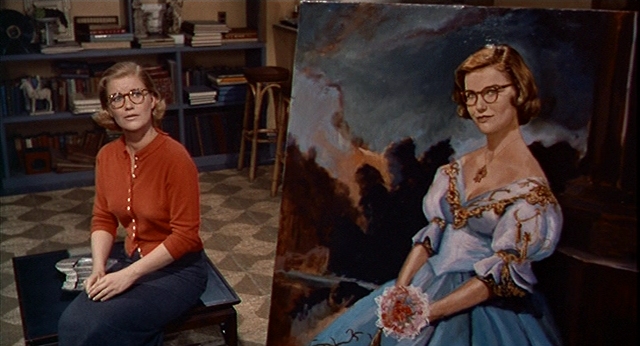
But Midge isn't thinking clearly. A fear is growing in her that she's losing their relationship, and in a frantic attempt to dispel her fear, she crafts a joke she thinks is funny and figures he will find it funny, too, because he's part of her team. Her fear has blinded her to the realisation that she's appealing to the wrong Scottie. The Scottie who was invariably on her side, ready to laugh with her, is not a Scottie that exists any more, if he ever truly did.
This is the first hard hint she has that the sort of master and disciple relationship she's outlined for the two of them was in fact her own fantasy. But the final blow isn't delivered to poor Midge until after Scottie's failure to stop Madeleine's death has brought him so low that he cannot even speak.
In the mental institution, Midge walks around Scottie, who's sitting, and outlines for him how she plans to treat and help him. But finally, she feels compelled to kneel beside him, look up at him, and plead;

MIDGE: "Oh, Johnny. Johnny, please try. Try, Johnny. You're not lost. Mother's here. "
Midge is reduced to directly stating her desired role. In the end, her pragmatism has been no more useful than Scottie's romanticism. A successful relationship between lovers is based on a mutual compulsion, not a philosophy or agenda, as Scottie and Judy themselves discover in the latter portion of the film.

The most obvious, unanticipated weakness Scottie meets in himself is, of course, his vertigo. Why is Vertigo the title of the movie? Because Scottie's debilitating acrophobia perfectly and succinctly represents what the movie's about; the existential horror of finding oneself voluntarily behaving in a way contrary to one's perceived or preferred personality, and to disastrous consequences.
Vertigo is not caused by psychological trauma in real life, but in the context of the movie it provides a neat shorthand for Scottie's despair at causing, because of his inadequacy, a fellow police officer to die. This is not how a hero's supposed to act, so what is he now? He can try to forget or rationalise what happened, but any visible, significant distance of empty space below him will instantly remind him that he's not what he thinks he is. Heights aren't merely an alarming mortal peril; they are his nemesis. A crooked and alien version of his self-image made real.

After seeing Madeleine die, Scottie has a rather terrible dream in which it appears that he has become Madeleine; he sees himself standing over Carlotta's open grave, as Madeleine did, he sees himself falling towards the red tiled roof of San Juan Batista, as Madeleine fell to her death. And this makes sense because Madeleine never existed except as a mutual, consensual fantasy shared between himself and Judy. Scottie's almost as much Madeleine as Judy was.
Of course, Scottie doesn't know yet that Madeleine was merely a role Judy was playing. Even when Judy decided to try to prevent Elster from murdering his wife, she didn't tell Scottie the truth. She was afraid both for his sake and hers; the blow to his self-image would be significant, and stepping so far off of her own prescribed route is too frightening to contemplate. But Judy's not interested in preventing the murder because she's suddenly developed a new moral compass; she wants to stop it because she's become Scottie's ally more than Elster's.
So why doesn't their relationship work when Scottie and Judy meet again? Is forcing her to dress a certain way any different than her relationship with Gavin, where she obviously tolerated it? It's very different for Judy, who seems tortured by the experience. As Hitchcock put it, "That scene in Vertigo where James Stewart forces Miss Kim Novak to alter her whole personality by altering her lipstick, hairstyle, even hair tint--for me it has the compulsion of a striptease in reverse. The woman is made insecure by being forced to make up, not take off."
Before, Judy dressed as Madeleine to serve her own purposes. Now, she's trying to take on a role to serve Scottie's confused compulsion.

JUDY: "Why are you doing this? What--what good will it do?"
SCOTTIE: "I don't know. I don't know. No good, I guess. I don't know."
JUDY: "I wish you'd leave me alone. I want to go away."
SCOTTIE: "You can, you know."
JUDY: "No, you--you wouldn't let me."
Once again, the existential concept of bad faith comes into play as Judy's superficial impulse is to blame Scottie for what she is in fact doing by choice. Like Midge before her, Judy's sacrificing herself for an agenda.
It's not only a woman Scottie's trying to resurrect through Judy; it's himself. The image of himself he'd retained throughout his adult life before the inability to prevent Madeleine's death broke him.
In one of the movie's most famous scenes, when Judy's "reverse striptease" is complete and she stands nakedly Madeleine before him, there is a powerful moment that seems, impossibly, to recapture what they had by some fey power as they're bathed in an unnatural green light.

The world seems to Scottie to dissolve into the San Juan Batista stables as Bernard Hermann's score becomes frantic before it crescendos with the pair's passionate kiss. It seems for a moment that they've actually resurrected the dream that initially brought them together and perhaps Scottie's reclaimed his own identity. Or is his identity stuck at San Juan Batista, the last place he saw Madeleine alive?
In the very next scene, Scottie's sitting comfortably and watching Judy put on some jewellery, preparing to go out to eat with him. Scottie's tone when he speaks to her is almost exactly the same tone he used to speak with Midge, earlier in the film. But one can only guess what Scottie's and Judy's relationship might have been like because it is here that Scottie sees Judy wearing Carlotta's necklace, and realises that Judy doesn't just look like Madeleine. She's in fact the same woman.
Realising he's been had, and so thoroughly, seems to enrage Scottie, but there's more to his reaction than rage. The final scene is nightmarish as Scottie takes her to San Juan Batista.
SCOTTIE: "One final thing I have to do. And then I'll be free of the past."
At the mission, Scottie drags Judy through the route of that fateful day.
SCOTTIE: "I need you to be Madeleine for a while."

He puts together the sequence of events even as he creates his own, new play as he drags Judy up the bell tower.
SCOTTIE: "You're my second chance, Judy."
And indeed she is. Because now that he knows the situations that shaped his personality before were false, he can see that the personality he saw himself as possessing was false, and the awful height of the bell tower is no longer any reflection of his weakness. His vertigo is gone. All that remains is free will.
Scottie and Judy are in a sort of identity free fall when they reach the top of the bell tower. When Judy falls from the tower after being frightened by the nun, it is a final statement about the absence of a benevolent agenda in the universe. A nun, supposedly a representative of a good and merciful god, inadvertently causes Judy's death. Scottie's left in a state of perfect zero. His identity is no longer trapped by the past, but he doesn't have one for the future, either.










